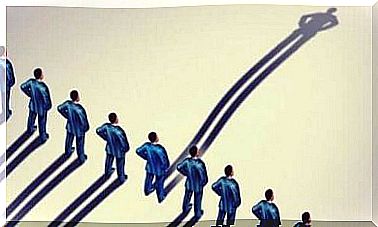Personal Devaluation: Feeling Worthless

Having self-esteem or good self-esteem means being aware of one’s own resources and potential. In addition, it means knowing your own faults and weaknesses. However, most people are not very good at their own self-esteem. In fact, you may find yourself going down all the wrong paths to trying to achieve good self-esteem. In fact, attempts to improve low self-esteem are usually prone to failure, and you may end up devaluing yourself over time. This is called personal devaluation.
Personal devaluation: Perseverance and resistance to change
Many seek recognition in their environment by helping or pleasing others. But if you always put others first, you can be completely overlooked. You probably do not think about yourself at all. In fact, you may feel that your only goal in life is to please others, and that is what gives your life purpose.
At the very least, this is probably what you tell yourself, so you can stop feeling like a doormat or something you wipe the floor with. But this strategy does not work. Because deep down, you still feel like a doormat. If you feel this, it can become a persistent and ongoing problem. You also feel resistance to change.
When something like a gesture, an action, a stamp, a style or a problem is systematized over a period of time, it becomes resistant to change. This results in a reduction in creativity. Therefore, if you have become accustomed to personally devaluing yourself, you will find that you have only a very small selection of solutions available. This means you do more of the same, instead of looking for new solutions.

Failure to recognize bad solutions
As strange and incredible as it may seem, some people use the same steps repeatedly to solve their problems, even if the previous results were not favorable. In other words, they only increase the dose of the same medicine repeatedly to cure the disease, even though they have done it before and it has not worked.
It seems that people have an ability to repeat the same methods over and over again, even if they do not work. Furthermore, they do not even ask questions or change these methods to get different results.
Repeating the same methods leads to the same results, many of which turn out to be wrong. These results tend to reinforce personal devaluation, confirm low self-esteem and all that comes with it.
There are many examples of solutions that fail. When a person who is afraid of elevators and closed rooms has to face them, they repeat over and over again “It will not happen, it will not happen” and start the whole chain of events so that it can actually happen.
A person with anorexia asks the whole family to eat, while continuing to reject food even more. A man with depression who feels sad, anxious and lethargic and does not even want to get out of bed, listens to his wife say: “Look at the beautiful day! Get up! Let’s go for a walk! ” This makes him feel useless. Everyone tells him what to do, and he can find no joy at all.
Seek value in the surroundings
If you find refuge in personal devaluation of yourself, you will not be able to achieve recognition and will only achieve results that are the opposite of what you really want. When you really want to be valued and appreciated in your own environment, you actually end up confirming your own personal devaluation.
This happens when it comes to donors who are always too willing to help others, and thus end up being used and treated badly. Similar is the case with the underrated person who always puts others first and ends up getting frustrated because they have never managed to fulfill any wishes in their own life.
Such helpers struggle to find security in a relationship because they tend to love unconditionally. In fact, devalued people will always put their partner first. In addition, they do not allow the partner to feel any need or desire. This is because they have already delivered it before the partner got the chance to feel a need or a desire.
This is actually a kind of slavery. Because the partner does not even get to feel the need to be with the person himself. It is hardly surprising that the devalued person eventually becomes almost invisible. Because they are always there, the partner fulfills every need and desire before the partner even realizes that the need or desire exists.
To love unconditionally therefore leads to invisibility, when what is actually desired is the exact opposite. Unconditional love actually confirms the low self-esteem of the devalued person.
Personal devaluation: Other examples
Another type of action that is often doomed to fail is when a young person turns out to be an outstanding student. These young people who strive for perfection through good grades hide their need for love, value and approval. Thus, they generate no expectations because family and friends know they are going to get the best results. Therefore, they lose their place in the spotlight because it is automatically expected that they will get good grades, and no matter how outstanding the performance is, it is largely ignored. This is the complete opposite of what they really want.
There are also those who place themselves in a position where they appear weak or will be felt sorry for. By doing this, they secretly hope that others will recognize qualities of endurance and strength in them. All that happens is that other people tend to feel the opposite. This is because they get tired of the constant complaining and “poor little me” attitude. In fact, they usually end up trying to avoid them altogether.
In some cases, the person may show a certain rationality in terms of their personal skills. When this happens, they actually acknowledge that they have a wide range of resources and argue that they value themselves. But when it comes to actually using these resources, they are weakened, have no faith in themselves and feel small and insignificant. This fact even becomes clear in the attitude, since more often than not you will see them bend their necks.

Behind personal devaluation: Insecurity, fear and guilt
Another consequence of personal devaluation is insecurity. When someone has low self-esteem, they are not sure how to handle situations. In this sense, personal devaluation and uncertainty go hand in hand. One follows the other.
An insecure person is insecure because they believe they have no opportunities or resources to support their actions. But a third concept completes this trilogy: fear.
Fear is a consequence of low self-confidence. The person is filled with negative thoughts that immobilize them and make them ashamed to face situations. Furthermore, they experience feelings and thoughts related to helplessness.
A fourth feeling is that the underestimated person feels guilt. This is the constant feeling that comes with all forms of personal devaluation. “I should have done it. I did not do it because I’m so stupid. “If I had finished school, I would have had a better career now.” They experience all these thoughts, along with even more inner rumination that makes them look down on themselves even more.
Believe in yourself
If you do not value yourself or believe in your own abilities, you will feel that you can not do anything because you will be unsure whether you present a rational and consistent enough impression on others. Then doubt arises. You will be full of questions, which increases your anxiety and doubt. You need to try to design a plan or build strategies and ways to achieve your goals. This way you can anticipate the situation and feel safer.
If you personally devalue yourself, you will be able to convert any kind of situation into a test in your imagination. You may decide that it is not even worth bothering with. You will be filled with fear of failure and lack of recognition. Such thoughts scare you. You are afraid that others will devalue you and find out who you really are. You are afraid that your imperfections and shortcomings will be exposed to everyone. This fear makes you lazy, and the splendor of your abilities cannot shine through.
Is healthy self-confidence possible?
Poor self-confidence is something that wastes and disrupts your plans. It prevents you from being creative, creates uncertainty and makes you anxious and worried. It complicates your relationship. In fact, it is such a plague that it gradually eats, ingests and destroys, and has a worsening effect on your personality.
On the other hand, true self-confidence is a feeling that arises spontaneously, in the face of the experience. It’s an inner feeling. It does not depend on external recognition. It’s a recognition of yourself.
Feeling valued is a state of mind where you are able to extract the positive from all situations, people and life in general. You also understand that you can not be everything to all people and situations. He who believes that they can be all things to all men, sets a rather high and mighty assumption.
Take care of yourself, let yourself grow, and do not let yourself fall into the trap of devaluing yourself.








